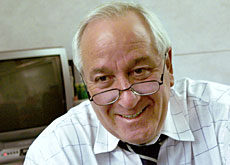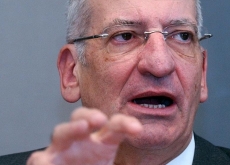Swiss strength lies in inclusion of minorities

For 24 years he followed developments in Swiss politics from an especially privileged position, but now Achille Casanova has vacated his post.
The former vice-chancellor and government spokesman, whose memories of government business go back a quarter of a century, told swissinfo he was concerned at the growing polarisation of political life.
At the age of 63, Casanova decided to step down before “the inexorable age limit” forced his departure.
Casanova was one of very few high-ranking government officials from the Italian-speaking canton of Ticino.
swissinfo: The foreign press association in Switzerland recently awarded you its prize for the most popular figure in Swiss public life. How does it feel to receive this recognition?
Achille Casanova: I was delighted because this is a prestigious award.
I was also pleased because it was awarded by the foreign press, whom I have always tried to keep informed, because I think it important that Switzerland receive media coverage in all parts of the world. Foreign journalists have a difficult task on their hands trying to explain our institutional system, which is not easily understood abroad.
swissinfo: You worked for 24 years with 26 different cabinet ministers. Which were the most difficult moments in your time as vice-chancellor?
A. C.: I can claim to have formed relationships of trust with all the cabinet ministers I have served, and with some of them I have become friends.
Difficult moments that come to mind are the occupation of our embassy in Poland, in 1982; Switzerland’s ‘no’ to joining the European Economic Area in 1992, which led to a political crisis; the issue of unclaimed Jewish funds in Swiss banks; and the Swissair crisis.
At times of crisis like these, it is very important to be present, to communicate, to try and achieve a degree of transparency, while maintaining unity among the government.
swissinfo: And what events gave you the greatest satisfaction?
A. C.: There were many such times, particularly when I was able to resolve difficulties in cabinet by applying a bit of psychology.
For example, when managing the controversy over transalpine railway links and the construction of new tunnels. It was important to keep the focus on ideas and principles, and not get drawn into personal disputes.
swissinfo: You took part in over 1,180 cabinet meetings. It has been suggested that these meetings should be made public, for the sake of transparency.
A. C.: Transparency of that kind is not possible in a context of collective cabinet responsibility, when all government members must defend the decisions they have taken together when speaking to outsiders. They would lose their credibility if it were known that, in cabinet, they had taken a position different from the one they were now defending.
Moreover, the transparency you mention would deprive ministers of their independence vis-à-vis their political party, pressure groups and the ministry for which they are responsible. And without this independence, they would not be able to reach compromise solutions.
swissinfo: In your years of serving the cabinet, what changes have you seen in Swiss political life, from your privileged position as government spokesman?
A. C.: Unfortunately, in recent years there has been a growing polarisation of political forces in Switzerland. I believe that in a political system like ours, with nationwide voting on key issues, only compromise solutions can possibly work.
And there is less and less willingness to strive for such solutions. The political parties, perhaps wanting to emphasise their distinctiveness, are less inclined to seek consensus.
And I must admit that some of the toughest political battles take place within the cabinet itself.
The danger is that we shall end up with a parliamentary system, with government and opposition parties. In my opinion, a system of this kind is not compatible with the direct democracy based on referendums of which we are so proud. It would lead to institutional paralysis.
Another reason it would not work is that Switzerland is a country of linguistic, cultural and religious diversity, with differences between urbanised and rural cantons, wealthy and less wealthy cantons.
swissinfo: Switzerland is a country of diversity, but you were one of the very few high-ranking federal officials from an Italian-speaking background…
A. C.: All the country’s cultural and linguistic forces should be involved in the federal administration, and above all in the government, in determining national goals and policy.
Solutions born of a single way of thinking create conflicts and are difficult for people from other backgrounds to accept. And this is dangerous for our national unity.
swissinfo: What should be done to strengthen the “Latin” presence in Bern?
A. C.: The main thing is to get this problem of minority representation – of political and cultural balance – back on the Swiss political agenda. Awareness of this issue has declined in recent years, as a result of globalisation and the headlong pursuit of efficiency.
The controversy surrounding the appointment of my successor seems to have brought this issue to the fore once again. That is a step in the right direction.
swissinfo-interview: Mariano Masserini
In 24 years, Achille Casanova attended 1,180 cabinet meetings.
He served 26 federal government ministers.
Now aged 63, Casanova resigned from the federal administration at the end of June.
In August, he takes up an appointment as ombudsman of Switzerland’s German-language radio and television service.
The departure of Achille Casanova marks the end of a political era, an era of collective responsibility and consensus between the political forces represented in the federal government.
In Switzerland, as elsewhere, political debate has become more antagonistic, resulting in a growing polarisation of political forces.
Casanova, who is from an Italian-speaking background, is concerned by the decline of the “Latin” presence in Bern, in the circles where national policy is decided. His successor as government spokesman is of German-speaking origin.

In compliance with the JTI standards
More: SWI swissinfo.ch certified by the Journalism Trust Initiative


You can find an overview of ongoing debates with our journalists here. Please join us!
If you want to start a conversation about a topic raised in this article or want to report factual errors, email us at english@swissinfo.ch.